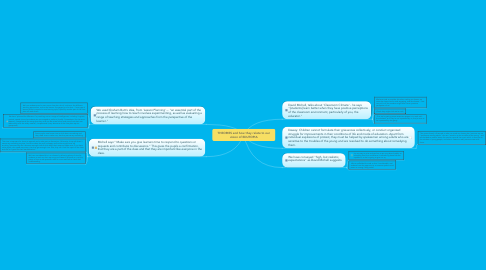THEORIES and how they relate to our vision of EDUTOPIA
by Samantha Joan Helps


1. David Michell, talks about 'Classroom Climate' - he says "[students] learn better when they have positive perceptions of the classroom environment, particularly of you, the educator."
1.1. We have tried to consider this when making our lesson, we want the class to be fun and engaging, and who knows - if we can pull it off the students might even have a positive perception of us!
1.2. (Oooh they might think we're cool)
1.3. Plus, we're getting some awesome rappers in to work with the students, so if they're not impressed by us, they're sure to be impressed by the gang!
2. Dewey: Children cannot formulate their grievances collectively, or conduct organized struggle for improvements in their conditions of life and mode of education. Apart from individual explosions of protest, they must be helped by spokesmen among adults who are sensitive to the troubles of the young and are resolved to do something about remedying them.
2.1. This quote directly influenced us when we made our lesson plan, because we are "spokesmen among adults" who are "sensitive to the troubles of the young" and we decided to make a lesson focused on rap and live music which is sensitive to the mindset of young people, and what it means to really communicate with them.
3. We used Graham Butt's idea, from 'Lesson Planning' -- "an essential part of the process of learning how to teach involves experimenting, as well as evaluating a range of teaching strategies and approaches from the perspective of the learner."
3.1. We have endeavoured to structure a class plan which involves a few different teaching approaches, so that the learner is engaged, and so that - if one type of learner doesn't respond to one learning style, hopefully another part of the class plan will reach them.
3.2. We have "planned for difference" by reaching out to a range of intelligences, including: linguistic, musical, spatial (since the students are encouraged to perform), bodily / kinaesthetic (for the same reasons), interpersonal (the songs that they write can be written alone and come from their own relationship with the study material), intrapersonal (many elements of the class plan require groupwork.)
3.2.1. Define actions as necessary
